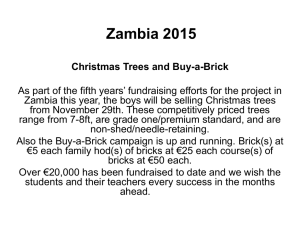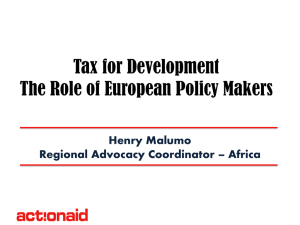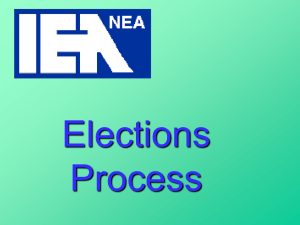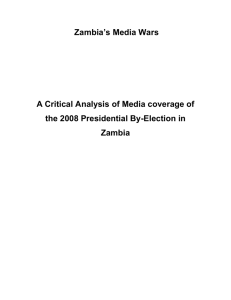ZNBC Guidelines and Principles for coverage of elections
advertisement
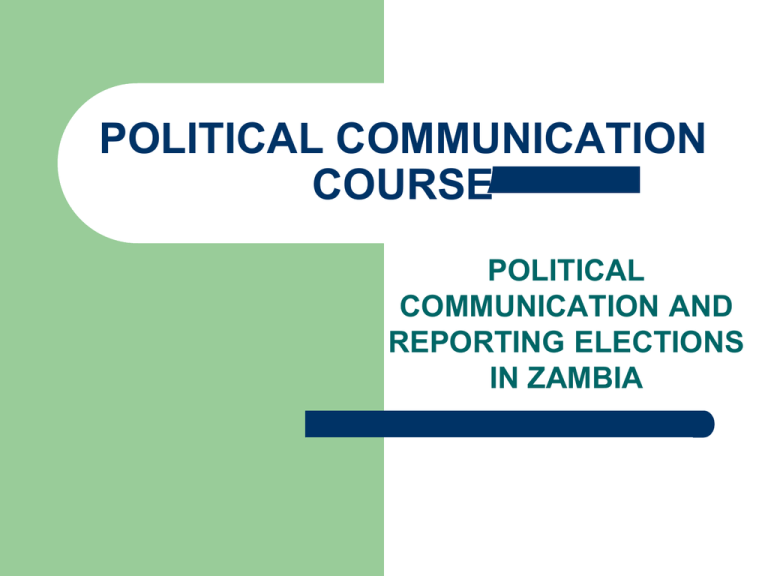
POLITICAL COMMUNICATION COURSE POLITICAL COMMUNICATION AND REPORTING ELECTIONS IN ZAMBIA POLITICAL COMMUNICATION AND REPORTING ELECTIONS IN ZAMBIA POLITICAL COMMUNICATION INTENSIVE COURSE HELD IN DAR ES SALAAM PRESENTED BY: EUSTACE NKANDU – LECTURER IN JOURNALISM AND MASS COMMUNICATION – UNIVERSITY OF ZAMBIA – DEPARTMENT OF MASS COMMUNICATION JUNE 2010 OUTLINE OF THE PRESENTATION 1. State of political communication in Zambia 3. Coverage of politics in Zambia 2. Electoral (Code of Conduct) Regulations, 2006 3. ZNBC Guidelines and Principles for coverage of elections 4. Findings of the 2008 presidential by elections study STATE OF POLITICAL COMMUNICATION IN ZAMBIA Major form of political communication is the mediated type. It is very difficult for people to stage demonstrations or simply to assemble to express their opinions. Members of the opposition parties and other people with dissenting views are blocked from meeting in public POLITICAL COMMINICATION IN ZAMBIA CONT’ The law (Public order Act) requires that people intending to hold public gatherings should notify the police 7 days in advance but the police always deny organisers the permit to do so. But members of the ruling party stage demonstrations at will Media coverage of politics in Zambia Polarisation of the media is highly evident especially the print media. The public media is used to dispel the perceived negative or critical coverage of the government in the private media while at the same time being used to project a positive image of the government. Media coverage of politics in Zambia The private media on the other hand grants massive coverage to the opposition political parties and those with dissenting views in a bid to strike some semblance of equal coverage. Media coverage of politics in Zambia The current media situation is not helping citizens to make informed decisions and choices because of the extreme positions taken by the print media. The media have created the image that has portrayed political tension in Zambia. Mediated political communication in the electronic media The private electronic media have created platforms for citizen participation by broadcasting discussion programs on various political topics. Almost all private radio and TV stations have live phone in programs. But ZNBC, both radio and TV has banned all phone in programs of political nature. Summary: Electoral Code of Conduct 2006 Duties of the media in Zambia All print and electronic media shall – Provide fair and balanced reporting of the campaigns, policies, meetings, rallies and press conferences of all registered political parties and candidates during the period of campaigning All print and electronic media shall Provide news of the electoral process up to the declaration of results Abide by regional codes of conduct in the coverage of elections provided that such guidelines are not in conflict with this code All media organizations shall Endeavour to Report election news in an accurate manner and not make any abusive editorial comment, incite violence or advocate hatred based on race, ethnicity, tribe, gender, political or religious conviction All media organizations shall Endeavour to Heads and other senior management staff of public or private media organizations shall not intimidate media practitioners and shall allow them to exercise professional judgment without undue influence All public and private media personnel shall Conduct interviews with candidates with fairness both in the style of the interview and in the amount of the time given All public and private media personnel shall Refrain from broadcasting their own political opinion, commentary or assessment; and where they wish to do so, they shall clearly identify the opinion, commentary or assessment as their own and shall carefully balance it in order to avoid bias. ZNBC Guidelines and Principles for coverage of elections The aim of election coverage is to ensure that the electorate is empowered to make an informed choice. The public is entitled to accurate, fair, impartial and balanced information about the election procedures, and the positions of political parties/independents and/or candidates on ZNBC Guidelines and Principles for coverage of elections ZNBC will provide opportunities for the public to take part in political debates on election issues. Producers of such broadcasts must be as representative as possible of different views and sectors of society ZNBC Guidelines and Principles for coverage of elections ZNBC shall regard with caution any statement or action by an official of an incumbent party and need to check thoroughly whether for example public appearances of Government officials are strictly on government business or part of their election campaign ZNBC Guidelines and Principles for coverage of elections ZNBC will make sure that any impression of one-sidedness is avoided in all programming. ZNBC will act and be seen to be acting in a fair and independent manner and not influenced by political or other interests ZNBC Guidelines and Principles for coverage of elections ZNBC will afford political parties and/or candidates the right of reply where a report aired under the editorial responsibility of the broadcaster contains inaccurate information or unfair criticism based on a distortion of facts. ZNBC Guidelines and Principles for coverage of elections ZNBC shall not broadcast views that could incite violence or advocate hatred that is based on race, ethnicity, gender, religion or political conviction and that constitute incitement to cause harm Findings of the 2008 presidential by elections study The study was commissioned by MISA Key findings: Polarisation of the media during election campaigns was very evident and it has continued to characterise election reporting KEY FINDINGS Both the quantitative and qualitative analyses showed that there was considerable amount of bias and in some cases lack of objectivity in the way the media coverage of the elections was done KEY FINDINGS Reportage based on political inclination was conspicuous. The public media favoured the party in government while the private media favoured the opposition parties in their coverage of election campaign activities. Number of stories in the Zambia Daily Mail (Quantitative analysis) Party Number of stories Percentage MMD 19 63.3 PF 8 26.7 UPND 3 10 HP 0 0.0 TOTAL 30 100.0 Number of stories quoting Presidential candidates: Zambia Daily Mail Candidates name Number of stories Percentage Mr. Rupiah Banda (MMD) 11 61 Mr. Hakainde Hichilema (UPND) 2 11 Mr. Michael Sata (PF) 5 28 Brig. Gen. Godfrey Miyanda (HP) 0 0 TOTAL 18 100.0 Number of election stories: ZNBC Party Number of stories Percentage MMD 26 65.5 PF 8 20.0 UPND 5 12.5 HP 1 2.5 TOTAL 40 100.0 Number of stories quoting candidates ZNBC Candidate’s Name Number of stories Percentage Mr. Rupiah Banda (MMD) 11 58 Mr. Michael Sata (PF) 4 21 Mr. Hakainde Hichilema (UPND) 4 21 Brig. Gen. Godfrey Miyanda (HP) 0 0 TOTAL 19 100.0 Number of stories with pictures - ZNBC Party Number of Pictures Percentage MMD 16 72.7 PF 4 18.2 UPND 2 9.1 HP 0 0.0 TOTAL 22 100.0 Number of stories: Post Newspaper Party Number of stories Percentage PF 18 41.9 MMD 15 34.9 UPND 9 20.9 HP 1 2.3 TOTAL 43 100.0 Number of stories quoting candidates – Post Newspaper Candidate’s Name Number of stories Percentage Mr. Rupiah Banda (MMD) 8 40 Mr. Michael Sata (PF) 6 30 Mr. Hakainde Hichilema 5 25 Brig. Gen. Godfrey Miyanda 1 5 TOTAL 20 100.0 Quantitative Analysis Headlines and nature of stories The 2008 coverage of elections was characterised by a number of what could be Termed as “opinionated or suggestive” headlines. The stories in the public media openly showed bright prospects for the ruling party THE END FOR MORE DETAILS ABOUT THE ANALYSIS OF MEDIA COVERAGE OF ELECTIONS CHECK: “ZAMBIA’S MEDIA WARS: AN ANALYSIS OF MEDIA COVERAGE OF 2008 PRESIDENTIAL BY – ELECTIONS IN ZAMBIA – MISA PUBLICATION


